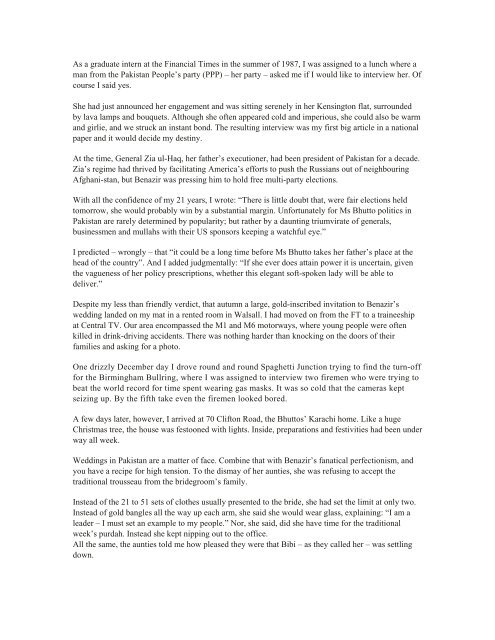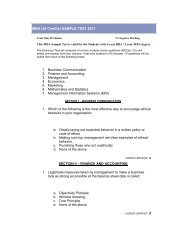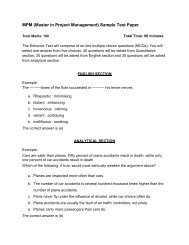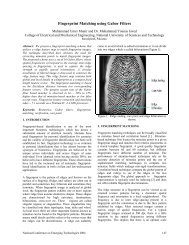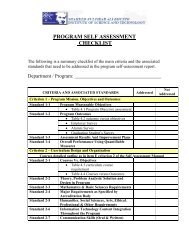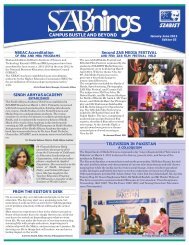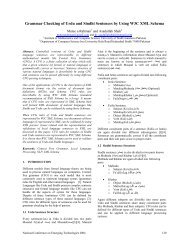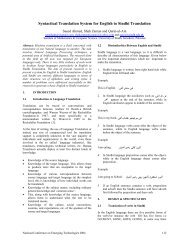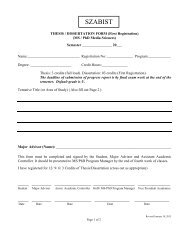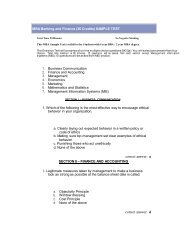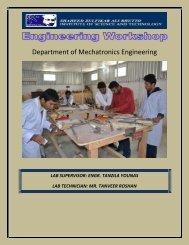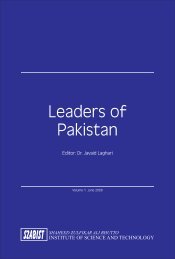Benazir Bhutto - SZABIST
Benazir Bhutto - SZABIST
Benazir Bhutto - SZABIST
You also want an ePaper? Increase the reach of your titles
YUMPU automatically turns print PDFs into web optimized ePapers that Google loves.
As a graduate intern at the Financial Times in the summer of 1987, I was assigned to a lunch where a<br />
man from the Pakistan People’s party (PPP) – her party – asked me if I would like to interview her. Of<br />
course I said yes.<br />
She had just announced her engagement and was sitting serenely in her Kensington flat, surrounded<br />
by lava lamps and bouquets. Although she often appeared cold and imperious, she could also be warm<br />
and girlie, and we struck an instant bond. The resulting interview was my first big article in a national<br />
paper and it would decide my destiny.<br />
At the time, General Zia ul-Haq, her father’s executioner, had been president of Pakistan for a decade.<br />
Zia’s regime had thrived by facilitating America’s efforts to push the Russians out of neighbouring<br />
Afghani-stan, but <strong>Benazir</strong> was pressing him to hold free multi-party elections.<br />
With all the confidence of my 21 years, I wrote: “There is little doubt that, were fair elections held<br />
tomorrow, she would probably win by a substantial margin. Unfortunately for Ms <strong>Bhutto</strong> politics in<br />
Pakistan are rarely determined by popularity; but rather by a daunting triumvirate of generals,<br />
businessmen and mullahs with their US sponsors keeping a watchful eye.”<br />
I predicted – wrongly – that “it could be a long time before Ms <strong>Bhutto</strong> takes her father’s place at the<br />
head of the country”. And I added judgmentally: “If she ever does attain power it is uncertain, given<br />
the vagueness of her policy prescriptions, whether this elegant soft-spoken lady will be able to<br />
deliver.”<br />
Despite my less than friendly verdict, that autumn a large, gold-inscribed invitation to <strong>Benazir</strong>’s<br />
wedding landed on my mat in a rented room in Walsall. I had moved on from the FT to a traineeship<br />
at Central TV. Our area encompassed the M1 and M6 motorways, where young people were often<br />
killed in drink-driving accidents. There was nothing harder than knocking on the doors of their<br />
families and asking for a photo.<br />
One drizzly December day I drove round and round Spaghetti Junction trying to find the turn-off<br />
for the Birmingham Bullring, where I was assigned to interview two firemen who were trying to<br />
beat the world record for time spent wearing gas masks. It was so cold that the cameras kept<br />
seizing up. By the fifth take even the firemen looked bored.<br />
A few days later, however, I arrived at 70 Clifton Road, the <strong>Bhutto</strong>s’ Karachi home. Like a huge<br />
Christmas tree, the house was festooned with lights. Inside, preparations and festivities had been under<br />
way all week.<br />
Weddings in Pakistan are a matter of face. Combine that with <strong>Benazir</strong>’s fanatical perfectionism, and<br />
you have a recipe for high tension. To the dismay of her aunties, she was refusing to accept the<br />
traditional trousseau from the bridegroom’s family.<br />
Instead of the 21 to 51 sets of clothes usually presented to the bride, she had set the limit at only two.<br />
Instead of gold bangles all the way up each arm, she said she would wear glass, explaining: “I am a<br />
leader – I must set an example to my people.” Nor, she said, did she have time for the traditional<br />
week’s purdah. Instead she kept nipping out to the office.<br />
All the same, the aunties told me how pleased they were that Bibi – as they called her – was settling<br />
down.


